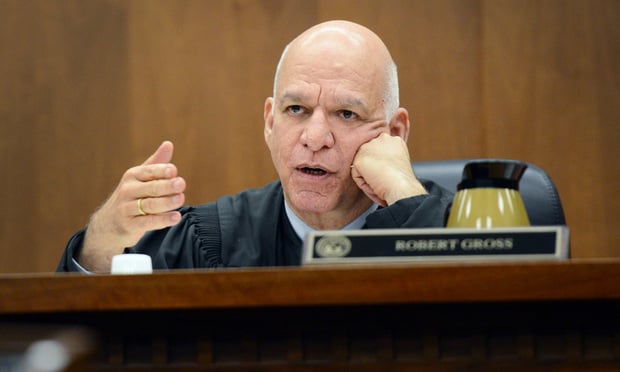Reduced Sanction for Contractor Who Sent Health Care Aide as Proxy in Construction Defect Mediation
After nine years of litigation, the court had ordered parties to send representatives with the power to settle the long-running dispute during mediation.
November 28, 2017 at 11:36 AM
4 minute read

A state appellate court reversed a compensatory fine imposed against a contractor who sent his father's home health aide to be his proxy at alternative dispute resolution proceedings in a construction defect case.
The Fourth District Court of Appeal affirmed “the finding of contempt in all respects” against Gregory “Skip” Gozzo, but found the fine tallied losses that weren't related to the contractor's use of a stand-in.
“The compensatory fine imposed here was flawed because it included attorney's fees and costs related to the summary jury trial,” Judge Robert Gross wrote in a unanimous decision with Fourth DCA Judges Martha Warner and Carole Taylor. “The defendants' contempt — the willful failure to attend and participate in the mediation — could not have caused damages incurred prior to the contempt.”
Gozzo, the former head of now-defunct Jupiter-based general contractor Gozzo Development Inc., was expected to attend mandatory mediation and a summary jury trial as part of alternative dispute resolution efforts in a complex case involving multiple parties and suits among defendants against each other. His firm was among several defendants in a suit by homeowner Anne Esker in Palm Beach County. In a move typical in these cases, the general contractor asserted its own claims in a fourth-party suit against other companies involved in the project.
Court records show the case had been litigated for nine years before at least two judges, when Palm Beach Circuit Judge Thomas Barkdull III ordered mandatory mediation by parties or surrogates with “authority to settle without further consultation.”
Summary jury trials are nonbinding but allow participants to gauge how multiple jury panels would rule when presented with real evidence from cases with numerous counterclaims and pretrial motions. They're intended to help encourage reasonable settlements in litigation that could otherwise balloon into mammoth undertakings.
Gozzo Development no longer exists, but filings from opposing litigants claim Gozzo should have been the one attending proceedings as the company's sole officer, shareholder and trustee at the time of its dissolution. Gozzo attended the summary jury trial, which he lost, but not the mediation. He instead sent Daphne Thomas, a woman described in his opponents' court pleadings as his father's caregiver.
Barkdull issued an order to show cause, requiring Gozzo to explain why the court shouldn't hold him in contempt for failing to comply with the order requiring the parties to send representatives with the power to settle this long-running dispute.
Gozzo explained he had missed the court date “because he had 'other things' to do and 'other business' on his plate,” according to the Fourth DCA opinion. He said he'd provided Thomas with verbal authority to settle, but the woman told the court otherwise. Thomas instead testified she knew nothing about the case until after she appeared at the mediation.
Barkdull found the defendants in contempt, and issued sanctions that awarded the plaintiffs attorney fees and costs for preparation and attendance at the summary jury trial, attendance at mediation, and all expenses related to the motions for sanctions and depositions taken before the contempt hearing.
A successor judge entered final judgment for nearly $122,519 in attorney fees and about $32,736 in court costs, plus prejudgment interest.
But the Fourth DCA reversed that decision, citing Florida Supreme Court precedent that requires a direct link between the willful violation of a court order and the loss the compensatory fine should cover. In this case, it found the lower court incorrectly included costs and fees linked to the summary jury trial, which Gozzo had attended.
Michael A. Monteverde and Daniel B. Allison, of Bressler Amery & Ross in Fort Lauderdale, represented Gozzo and Gozzo Development Inc. Tara S. Pellegrino and Jacqueline S. Miller, of Broad and Cassel in West Palm Beach, represented homeowner Esker. They did not respond to a request for comment by press time.
The appellate panel reversed the award of attorney fees and costs, and remanded the case to the circuit court for a new hearing. It ordered the lower court to limit the sanction to attendance and preparation costs for the mediation, expenses associated with the sanctions motion, costs for taking depositions in the contempt action, and preparation for the new damages hearing.
This content has been archived. It is available through our partners, LexisNexis® and Bloomberg Law.
To view this content, please continue to their sites.
Not a Lexis Subscriber?
Subscribe Now
Not a Bloomberg Law Subscriber?
Subscribe Now
NOT FOR REPRINT
© 2025 ALM Global, LLC, All Rights Reserved. Request academic re-use from www.copyright.com. All other uses, submit a request to [email protected]. For more information visit Asset & Logo Licensing.
You Might Like
View All
Miami Judge Approves Shaq's $11 Million Settlement to Resolve Astrals Investor Claims
3 minute read
A Voyeur Videotaped Them Undressing. Should Cruise Ship Passengers Have to Arbitrate?
3 minute read
Read the Document: DOJ Releases Ex-Special Counsel's Report Explaining Trump Prosecutions
3 minute read
Supreme Court Wrestles With Disabled Ex-Firefighter's Discrimination Case
Trending Stories
Who Got The Work
J. Brugh Lower of Gibbons has entered an appearance for industrial equipment supplier Devco Corporation in a pending trademark infringement lawsuit. The suit, accusing the defendant of selling knock-off Graco products, was filed Dec. 18 in New Jersey District Court by Rivkin Radler on behalf of Graco Inc. and Graco Minnesota. The case, assigned to U.S. District Judge Zahid N. Quraishi, is 3:24-cv-11294, Graco Inc. et al v. Devco Corporation.
Who Got The Work
Rebecca Maller-Stein and Kent A. Yalowitz of Arnold & Porter Kaye Scholer have entered their appearances for Hanaco Venture Capital and its executives, Lior Prosor and David Frankel, in a pending securities lawsuit. The action, filed on Dec. 24 in New York Southern District Court by Zell, Aron & Co. on behalf of Goldeneye Advisors, accuses the defendants of negligently and fraudulently managing the plaintiff's $1 million investment. The case, assigned to U.S. District Judge Vernon S. Broderick, is 1:24-cv-09918, Goldeneye Advisors, LLC v. Hanaco Venture Capital, Ltd. et al.
Who Got The Work
Attorneys from A&O Shearman has stepped in as defense counsel for Toronto-Dominion Bank and other defendants in a pending securities class action. The suit, filed Dec. 11 in New York Southern District Court by Bleichmar Fonti & Auld, accuses the defendants of concealing the bank's 'pervasive' deficiencies in regards to its compliance with the Bank Secrecy Act and the quality of its anti-money laundering controls. The case, assigned to U.S. District Judge Arun Subramanian, is 1:24-cv-09445, Gonzalez v. The Toronto-Dominion Bank et al.
Who Got The Work
Crown Castle International, a Pennsylvania company providing shared communications infrastructure, has turned to Luke D. Wolf of Gordon Rees Scully Mansukhani to fend off a pending breach-of-contract lawsuit. The court action, filed Nov. 25 in Michigan Eastern District Court by Hooper Hathaway PC on behalf of The Town Residences LLC, accuses Crown Castle of failing to transfer approximately $30,000 in utility payments from T-Mobile in breach of a roof-top lease and assignment agreement. The case, assigned to U.S. District Judge Susan K. Declercq, is 2:24-cv-13131, The Town Residences LLC v. T-Mobile US, Inc. et al.
Who Got The Work
Wilfred P. Coronato and Daniel M. Schwartz of McCarter & English have stepped in as defense counsel to Electrolux Home Products Inc. in a pending product liability lawsuit. The court action, filed Nov. 26 in New York Eastern District Court by Poulos Lopiccolo PC and Nagel Rice LLP on behalf of David Stern, alleges that the defendant's refrigerators’ drawers and shelving repeatedly break and fall apart within months after purchase. The case, assigned to U.S. District Judge Joan M. Azrack, is 2:24-cv-08204, Stern v. Electrolux Home Products, Inc.
Featured Firms
Law Offices of Gary Martin Hays & Associates, P.C.
(470) 294-1674
Law Offices of Mark E. Salomone
(857) 444-6468
Smith & Hassler
(713) 739-1250






